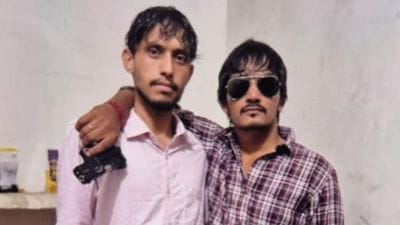Veteran who walked Sangh-Govt tightrope
Former RSS chief Rajendra Singh alias Rajju Bhaiyya died of a prolonged illness today in Pune. He was 81. Rajju Bhaiyya did not match even t...

Former RSS chief Rajendra Singh alias Rajju Bhaiyya died of a prolonged illness today in Pune. He was 81.
Rajju Bhaiyya did not match even the Balasaheb Deoras or Bhaurao Deoras in terms of moral authority over the ‘‘swayamsevaks’’ but he commanded a certain degree of personal influence over the BJP duo of Prime Minister A.B. Vajpayee and Deputy Prime Minister L.K. Advani.
|
A scholarly father figure, |
|
|
Nagpur: With the news of Rajju Bhaiyya’s death, a pall of gloom descended on the RSS headquarters in Mahal area of Nagpur and the Smruti Mandir premises housing the Hedgewar Memorial here. In his condolence message, RSS chief K.S. Sudershan said Rajju Bhaiyya was a scholarly father figure in the Sangh and that his death has left a void that is difficult to fill. ‘‘He was a mild-mannered man and a complete Sangh swayamsevak. His health had deteriorated over the last 10-12 days. Even in that condition he used to speak about the Sangh work. He used to say that the Sangh has done a lot and has reached somewhere, but there is still a lot to do. He would keep reciting the Vande Mataram,’’ Sudershan said. Sudershan and Sarkaryawah Mohan Bhagwat left for Pune later in the evening to attend Rajju Bhaiyya’s funeral, scheduled for Tuesday. — ENS |
He was certainly far more effective with the duo than the present Sarsanghchalak K.S. Sudarshan. If his predecessors were presiding deities or family elders, he was at least the elder brother, ‘‘Bhaiyya’’, for Parivar members.
Nothing would bring out better the absence of a uniting force like him in the Parivar today than the occasional tiffs among members of India’s largest undivided Hindu family. It is another matter that most people, now used to watching the Vajpayees and Ashok Singhals engaged in a fratricidal war, would find it difficult to relate this phenomenon to his death. For, long before death removed him from the scene, Rajju Bhaiyya had ceased playing the umpire due to ill health.
Till the time Rajju Bhaiyya ascended to the post of sarsanghchalak, detractors of the RSS used to derisively refer to the organisation as the ‘‘Maharashtrian Brahmin Club’’. He was the first non-Brahmin and non-Maharashtrian sarsanghchalak. The fourth to hold the top RSS slot, he invested the office with a wider social profile and intellectual calibre.
Born into an educated Rajput family in UP’s Bulandshahar district, he was a physics teacher at Allahabad University when he was drawn towards the RSS under the influence of Bhaurao Deoras and Bhaiyyaji Dani, an RSS pracharak, in the early ’40s. Once into the RSS in the ’60s, he fell in line with the near-ascetic lifestyle of a pracharak with perfect ease. An RSS leader recalled that once on a visit to Allahabad, he pointed at his favourite corner at the railway station where he used to doze off while waiting for trains. Rajju Bhaiyya would make no secret of his sole regret as a pracharak that unlike some of his more privileged colleagues, he had never come in personal contact with RSS founder K.S. Hedgewar.
Gradually moving his way up, he became the RSS general secretary in the 1980’s when the Hindutva, thanks to the Ramjanmabhoomi movement, spearheaded by the VHP and boosted by then BJP president L.K. Advani, became an integral part of the political lexicon.
He inherited the mantle of the RSS chief from Balasaheb Deoras in 1994. As destiny willed, he steered the organisation during a crucial phase when the BJP, the Sangh’s political arm, first emerged as the single largest party in the Lok Sabha in 1996 and then captured power in 1998.
Unfortunately for the Parivar, Rajju Bhaiyya gave up office in 2000, around the time when the contradictions between statesmanship required of rulers and the ideological idealism, which charged swayamsevaks, began to unfold. However, his illness did not stop him from experiencing the agony of watching the Parivar tied in knots of its own making. He told the Nagpur Pratinidhi Sabha of the RSS from a wheelchair in March that even though it was not so, the message the outside world was getting was that the Parivar was in a state of war within which was not good for ‘‘all of us’’.
Things have not changed since. For, it would take some ‘‘big brother’’ like him for things to change. At a purely individual level, as Rajju Bhaiyya fades into history, his palatial house in the posh Civil Lines Area of Allahabad, that now houses a school and the local RSS office, remains a symbol of a life that lived up to an ideological commitment and utmost simplicity.
Photos





- 01
- 02
- 03
- 04
- 05


























